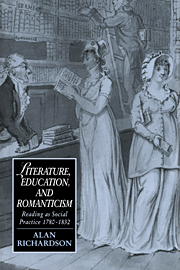6 - Epilogue: Romanticism and the idea of literature
Published online by Cambridge University Press: 08 February 2010
Summary
In its 1825 attack on Brougham and the SDUK, Blackwood's had staked out the ideological ground on which Southey would promote and the Quarterly Review defend the provision of imaginative literature for the “humbler classes.” Arguing that laborers are already possessed of a good deal of useful knowledge, not to be confused with book learning, the reviewer for Blackwood's finds instead “moral education” wanting among the working classes, a study which should precede useful or merely “professional” knowledge and which Brougham's proposals sadly lack. He particularly recommends the reading of novels, valued for their ability to “implant good feelings” while beguiling the reader with “fascinating” narratives. Much as the novel had been rehabilitated as a moral form appropriate for young middle-class women, it is now singled out for another group innocent of Classical learning and lacking in direct “knowledge of the principles … habits, and character of good society.” The reviewer means to endorse only, of course, those “good novels” – chosen by the “better classes” who must wield vigilant control over their dissemination – designed to make readers “intelligent, well-principled, moral, and respectable” (548, 550–51). The rival program of the “Fox and Bentham schools” is calculated to “dissolve the bonds between the poor and the rich” and will render working men “slaves of the worst kind of faction” (549); the remedy is sought in the best kind of fiction.
- Type
- Chapter
- Information
- Literature, Education, and RomanticismReading as Social Practice, 1780–1832, pp. 260 - 272Publisher: Cambridge University PressPrint publication year: 1994



